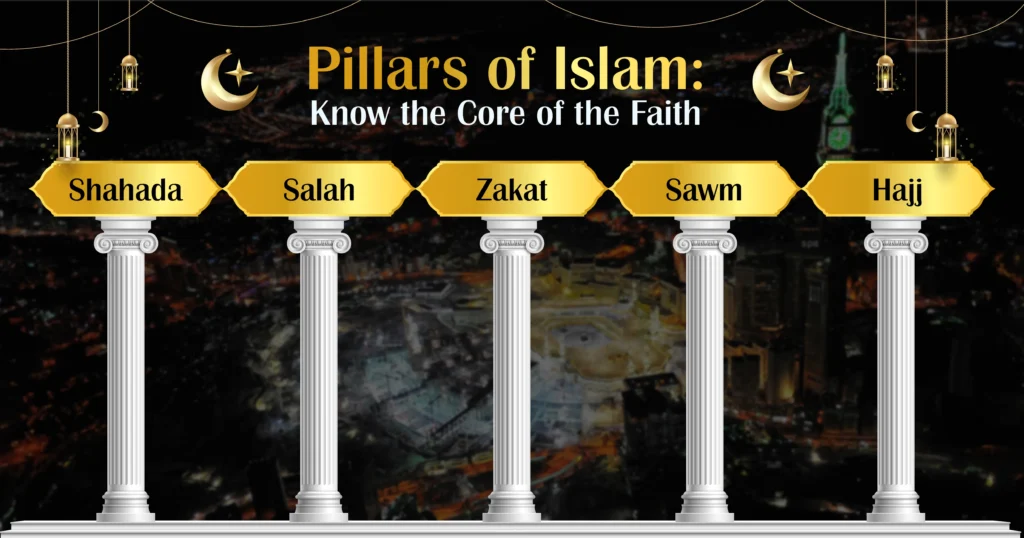Introduction to Basics of Islam also Pillars of Islam:
Islam is a divine way of life, offering guidance for both the soul and society. Muslims believe in One God (Allah), follow the teachings of the final Prophet Muhammad ﷺ, and live by the divine revelations in the Qur’an. At the heart of this lifestyle are five fundamental obligations known as the Pillars of Islam.
These pillars are not mere rituals—they are spiritual anchors that shape a Muslim’s identity, actions, and purpose.
🕌 What Are the Pillars of Islam?
The Pillars of Islam are five core practices that every Muslim is expected to fulfill. These acts represent the essence of worship, obedience, and submission to Allah. They define the relationship between the believer and their Creator, as well as the believer and society.

☝️ 1. Shahadah (الشهادتان) – Declaration of Faith
Arabic:
أشهد أن لا إله إلا الله وأشهد أن محمدًا رسول الله
“I bear witness that there is no god but Allah, and I bear witness that Muhammad ﷺ is the Messenger of Allah.”
What It Means:
The Shahadah is the foundation of belief in Islam. It affirms two key concepts:
- Tawheed (Oneness of Allah) – There is no partner, rival, or equal to Allah.
- Finality of Prophethood – Muhammad ﷺ is the last messenger in a long line of prophets sent by Allah.
Spiritual Significance:
- It signifies the moment a person becomes a Muslim.
- It reflects a complete commitment to live according to Allah’s will.
- It’s recited daily in prayers and at key moments in life.
Impact:
The Shahadah is not just spoken—it’s lived. A believer strives to align their heart, words, and actions with this testimony throughout their life.

🙏 2. Salah (الصلاة) – The Five Daily Prayers
What It Means:
Salah is the daily act of worship performed five times a day, at prescribed times. It includes physical actions, recitations from the Qur’an, and supplications.
Purpose:
- Strengthens the connection between the believer and Allah.
- Provides structure, discipline, and mindfulness throughout the day.
- Encourages purity, humility, and reflection.
Each Prayer Serves a Purpose:
- Fajr (pre-dawn) – Start the day with spiritual clarity.
- Dhuhr (midday) – A pause from daily work to refocus on Allah.
- Asr (afternoon) – Strengthens patience and purpose.
- Maghrib (sunset) – Offers thanks at the end of the day.
- Isha (night) – A peaceful conclusion and reminder of the Hereafter.
Rewards & Virtues:
- Salah washes away sins (Hadith: Muslim).
- It is the first thing a person will be asked about on the Day of Judgment.
- It protects the heart from evil and sin.
💰 3. Zakah (الزكاة) – Obligatory Charity
What It Means:
Zakah is a compulsory form of charity given by Muslims who meet the minimum wealth threshold (Nisab). It is usually 2.5% of annual savings.
Purpose & Wisdom:
- Purifies wealth and hearts from greed and materialism.
- Supports the less fortunate and uplifts the entire society.
- Reduces poverty and economic inequality.
Who Receives Zakah?
- The poor
- The needy
- Those in debt
- New Muslims
- Travelers
- Others mentioned in Qur’an (9:60)
Difference from Sadaqah:
- Zakah is mandatory and has specific rules.
- Sadaqah is voluntary charity that can be given any time in any amount.
Spiritual Impact: Giving Zakah reminds the believer that all wealth belongs to Allah and we are mere custodians.

🌙 4. Sawm (الصوم) – Fasting in Ramadan
What It Means:
Sawm is the act of fasting during the month of Ramadan, from dawn (Fajr) to sunset (Maghrib), refraining from:
- Food and drink
- Intimate relations
- Lying, backbiting, anger, and all sinful acts
Purpose of Fasting:
- To attain Taqwa (God-consciousness)
- To experience empathy with the poor and hungry
- To practice self-control and patience
Virtues of Ramadan:
- The Qur’an was revealed in this month.
- Night of Qadr (Laylat al-Qadr) falls in the last 10 nights – better than a thousand months.
- Gates of Jannah are opened; rewards are multiplied.
Beyond Hunger:
True fasting is not just physical—it’s spiritual. The Prophet ﷺ said:
“Whoever does not give up false speech and acting upon it, Allah is not in need of his leaving food and drink.” (Bukhari)
🕋 5. Hajj (الحج) – Pilgrimage to Makkah
What It Means:
Hajj is a once-in-a-lifetime obligation for those who can afford it and are physically capable. It takes place during the Islamic month of Dhul-Hijjah.
Key Rituals Include:
- Wearing Ihram (simple white clothes)
- Tawaf (circling the Kaaba)
- Sa’i (walking between Safa and Marwah)
- Standing at Arafah
- Stoning the devil at Mina
- Qurbani (sacrifice)
Spiritual Impact:
- Symbolizes equality – all pilgrims wear the same clothes, erasing differences.
- A time of total submission and humility before Allah.
- Cleanses the believer of all previous sins if performed sincerely.
Hadith:
“Whoever performs Hajj for Allah and does not engage in sexual relations, sin, or dispute during the Hajj, will return home like the day his mother gave birth to him.” (Bukhari)
🔚 Conclusion: Living by the Pillars of Islam
The Pillars of Islam are more than a checklist—they are a holistic system of spiritual development and social responsibility. From affirming our faith (Shahadah), staying connected to Allah (Salah), helping society (Zakah), training the soul (Sawm), to embarking on the ultimate journey of submission (Hajj)—each pillar transforms the believer into a better servant of Allah and a contributor to humanity.
Let us reflect:
Are we truly living the Pillars of Islam in our daily lives? Let’s take the next step—learn, understand, and practice Islam with sincerity.
📘 Continue Your Journey on Islam180.com
Upcoming topics:
- “Understanding the Quran: Its Structure, Message & Relevance Today”
- “Daily Islamic Practices for Personal Growth”
Subscribe now to never miss a post, and share this blog to spread the message of Islam!



